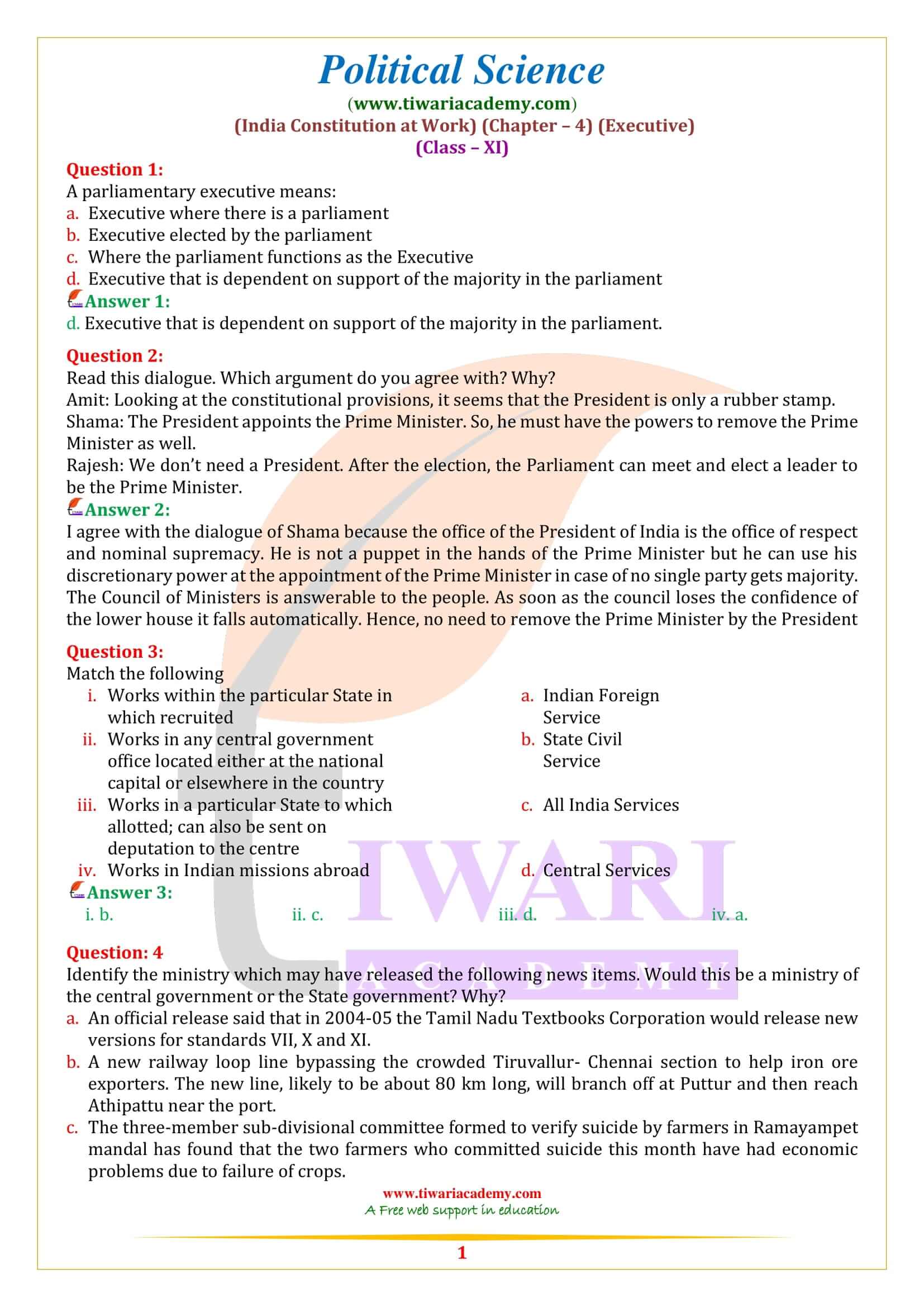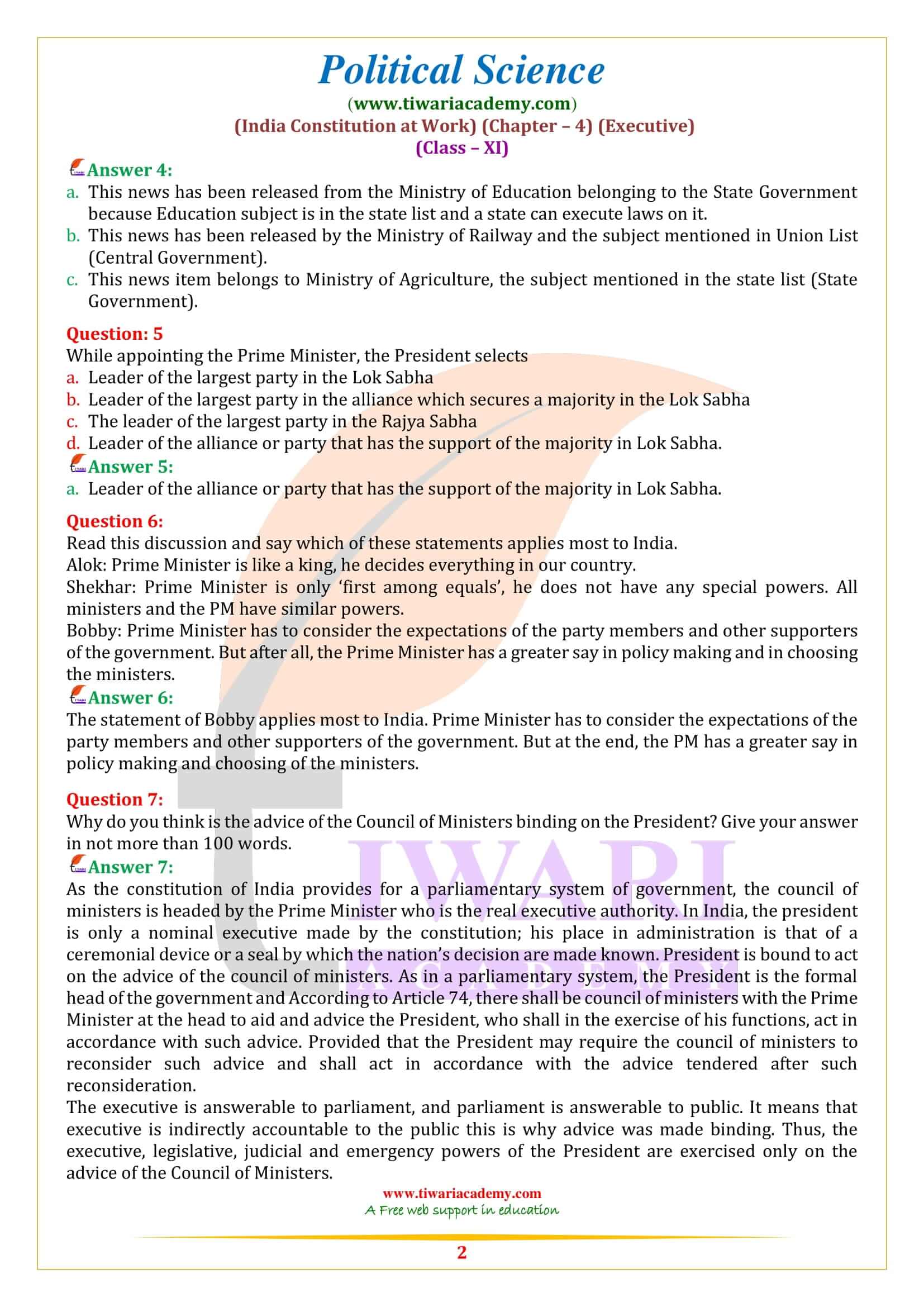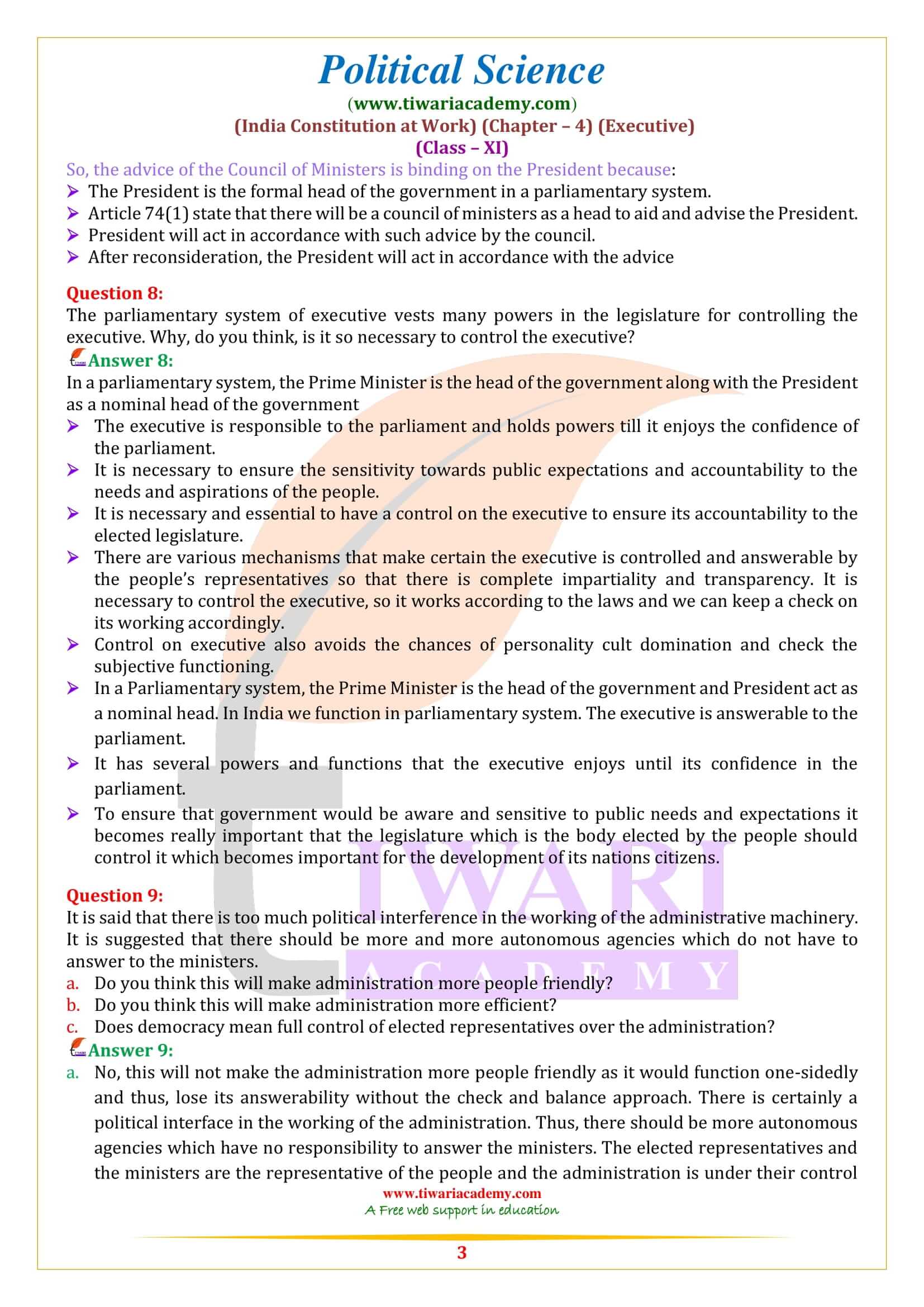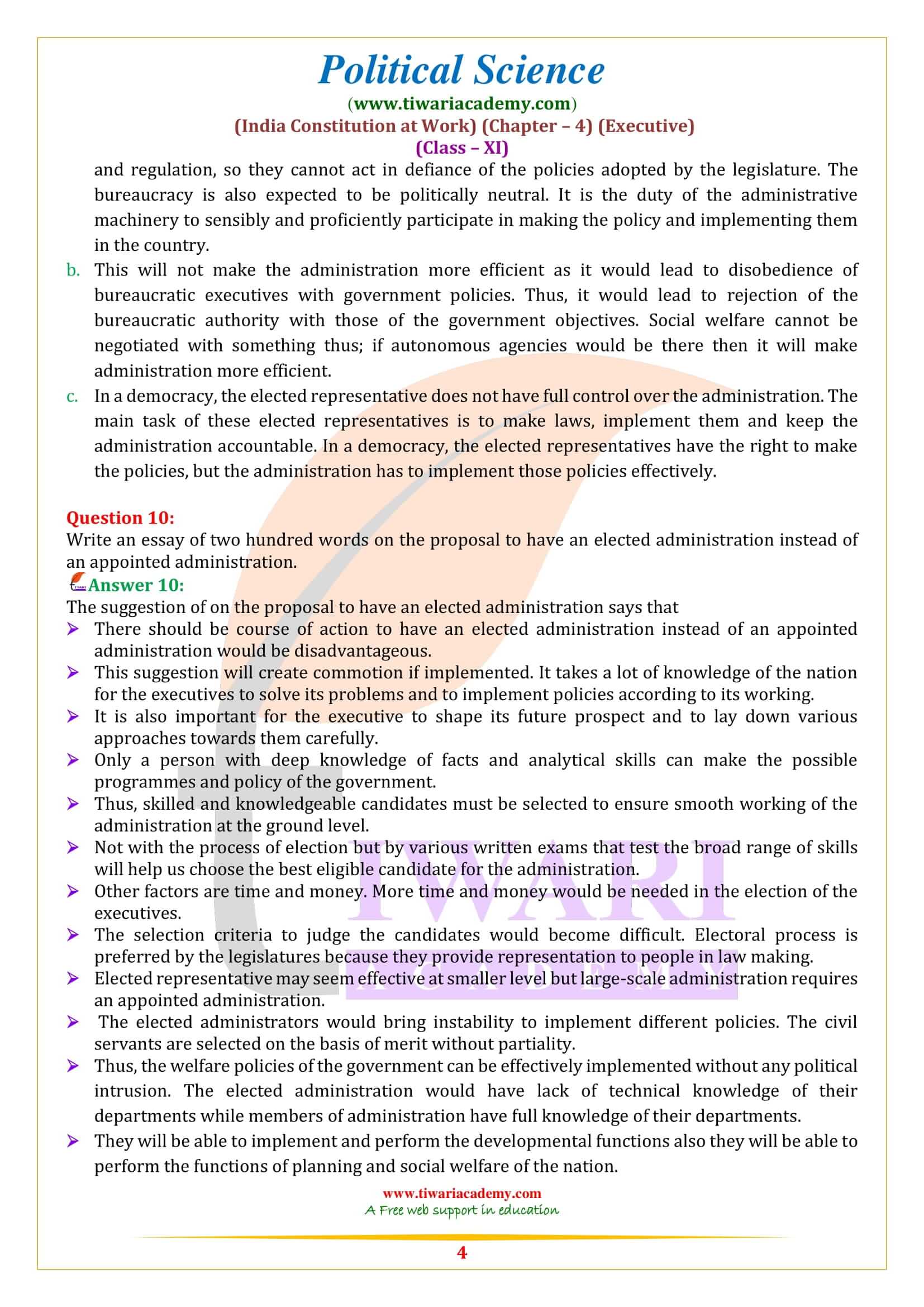NCERT Solutions for Class 11 Political Science Chapter 4 Executive in Hindi and English Medium prepared and modified for new academics session 2025-26 free to use. Get here all short and long questions of class 11 Political Science chapter 4 of Indian Constitution at Work in easy format.
NCERT Solutions for Class 11 Political Science Chapter 4
Why do you think is the advice of the Council of Ministers binding on the President? Give your answer in not more than 100 words.
As the constitution of India provides for a parliamentary system of government, the council of ministers is headed by the Prime Minister who is the real executive authority. In India, the president is only a nominal executive made by the constitution; his place in administration is that of a ceremonial device or a seal by which the nation’s decision are made known. President is bound to act on the advice of the council of ministers. As in a parliamentary system, the President is the formal head of the government and According to Article 74, there shall be council of ministers with the Prime Minister at the head to aid and advice the President, who shall in the exercise of his functions, act in accordance with such advice. Provided that the President may require the council of ministers to reconsider such advice and shall act in accordance with the advice tendered after such reconsideration.
The executive is answerable to parliament, and parliament is answerable to public. It means that executive is indirectly accountable to the public this is why advice was made binding. Thus, the executive, legislative, judicial and emergency powers of the President are exercised only on the advice of the Council of Ministers.
So, the advice of the Council of Ministers is binding on the President because:
- The President is the formal head of the government in a parliamentary system.
- Article 74(1) state that there will be a council of ministers as a head to aid and advise the President.
- President will act in accordance with such advice by the council.
- After reconsideration, the President will act in accordance with the advice
The parliamentary system of executive vests many powers in the legislature for controlling the executive. Why, do you think, is it so necessary to control the executive?
In a parliamentary system, the Prime Minister is the head of the government along with the President as a nominal head of the government.
- The executive is responsible to the parliament and holds powers till it enjoys the confidence of the parliament.
- It is necessary to ensure the sensitivity towards public expectations and accountability to the needs and aspirations of the people.
- It is necessary and essential to have a control on the executive to ensure its accountability to the elected legislature.
- There are various mechanisms that make certain the executive is controlled and answerable by the people’s representatives so that there is complete impartiality and transparency. It is necessary to control the executive, so it works according to the laws and we can keep a check on its working accordingly.
- Control on executive also avoids the chances of personality cult domination and check the subjective functioning.
- In a Parliamentary system, the Prime Minister is the head of the government and President act as a nominal head. In India we function in parliamentary system. The executive is answerable to the parliament.
- It has several powers and functions that the executive enjoys until its confidence in the parliament.
- To ensure that government would be aware and sensitive to public needs and expectations it becomes really important that the legislature which is the body elected by the people should control it which becomes important for the development of its nations citizens.
It is said that there is too much political interference in the working of the administrative machinery. It is suggested that there should be more and more autonomous agencies which do not have to answer to the ministers.
Do you think this will make administration more people friendly?
No, this will not make the administration more people friendly as it would function one-sidedly and thus, lose its answerability without the check and balance approach. There is certainly a political interface in the working of the administration. Thus, there should be more autonomous agencies which have no responsibility to answer the ministers. The elected representatives and the ministers are the representative of the people and the administration is under their control and regulation, so they cannot act in defiance of the policies adopted by the legislature. The bureaucracy is also expected to be politically neutral. It is the duty of the administrative machinery to sensibly and proficiently participate in making the policy and implementing them in the country.
Do you think this will make administration more efficient?
This will not make the administration more efficient as it would lead to disobedience of bureaucratic executives with government policies. Thus, it would lead to rejection of the bureaucratic authority with those of the government objectives. Social welfare cannot be negotiated with something thus; if autonomous agencies would be there then it will make administration more efficient.
Does democracy mean full control of elected representatives over the administration?
In a democracy, the elected representative does not have full control over the administration. The main task of these elected representatives is to make laws, implement them and keep the administration accountable. In a democracy, the elected representatives have the right to make the policies, but the administration has to implement those policies effectively.
Write an essay of two hundred words on the proposal to have an elected administration instead of an appointed administration.
The suggestion of on the proposal to have an elected administration says that:
- There should be course of action to have an elected administration instead of an appointed administration would be disadvantageous.
- This suggestion will create commotion if implemented. It takes a lot of knowledge of the nation for the executives to solve its problems and to implement policies according to its working.
- It is also important for the executive to shape its future prospect and to lay down various approaches towards them carefully.
- Only a person with deep knowledge of facts and analytical skills can make the possible programmes and policy of the government.
- Thus, skilled and knowledgeable candidates must be selected to ensure smooth working of the administration at the ground level.
- Not with the process of election but by various written exams that test the broad range of skills will help us choose the best eligible candidate for the administration.
- Other factors are time and money. More time and money would be needed in the election of the executives.
- The selection criteria to judge the candidates would become difficult. Electoral process is preferred by the legislatures because they provide representation to people in law making.
- Elected representative may seem effective at smaller level but large-scale administration requires an appointed administration.
- The elected administrators would bring instability to implement different policies. The civil servants are selected on the basis of merit without partiality.
- Thus, the welfare policies of the government can be effectively implemented without any political intrusion. The elected administration would have lack of technical knowledge of their departments while members of administration have full knowledge of their departments.
- They will be able to implement and perform the developmental functions also they will be able to perform the functions of planning and social welfare of the nation.





